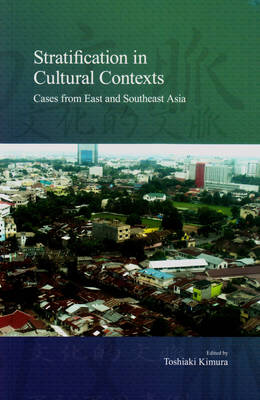
Door een staking bij bpost kan je online bestelling op dit moment iets langer onderweg zijn dan voorzien. Dringend iets nodig? Onze winkels ontvangen jou met open armen!
- Afhalen na 1 uur in een winkel met voorraad
- Gratis thuislevering in België vanaf € 30
- Ruim aanbod met 7 miljoen producten
Door een staking bij bpost kan je online bestelling op dit moment iets langer onderweg zijn dan voorzien. Dringend iets nodig? Onze winkels ontvangen jou met open armen!
- Afhalen na 1 uur in een winkel met voorraad
- Gratis thuislevering in België vanaf € 30
- Ruim aanbod met 7 miljoen producten
Zoeken
Stratification in Cultural Contexts
Cases from East and Southeast Asia Volume 15
€ 44,95
+ 89 punten
Omschrijving
Now available in paperback, Stratification in Cultural Contexts is a collection drawn from research results of the East Asian Division of the Center for the Study of Social Stratification and Inequality at Tohoku University. In this book, scholars who specialize in areas of East and Southeast Asia examine how the problem of stratification manifests itself in different cultural and historical contexts, discussing when and under what circumstances the problem of stratification has become more serious, and suggesting how the tension could be eased. The topics dealt with are diversified, from religion to economic concerns. The local wisdom of traditional societies is used to analyze inequality and stratification in cases such as the phenomenon of 'religious revival' following democratization in Mongolian society, the lives of 'slaves' under the Choson dynasty in Korea, and the role of warrior-class women in early-modern Japan. This volume provides a strong step on the way to further studies of stratification and inequality in cultural contexts. (Series: Stratification and Inequality - Vol. 15)
Specificaties
Betrokkenen
- Uitgeverij:
Inhoud
- Aantal bladzijden:
- 180
- Taal:
- Engels
- Reeks:
- Reeksnummer:
- nr. 15
Eigenschappen
- Productcode (EAN):
- 9781920901363
- Verschijningsdatum:
- 1/10/2013
- Uitvoering:
- Paperback
- Formaat:
- Trade paperback (VS)
- Afmetingen:
- 137 mm x 213 mm
- Gewicht:
- 249 g

Alleen bij Standaard Boekhandel
+ 89 punten op je klantenkaart van Standaard Boekhandel
Beoordelingen
We publiceren alleen reviews die voldoen aan de voorwaarden voor reviews. Bekijk onze voorwaarden voor reviews.










